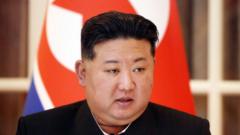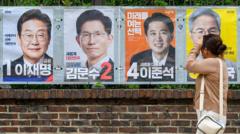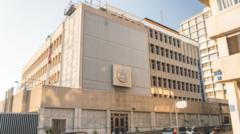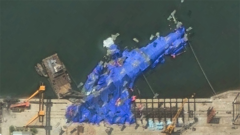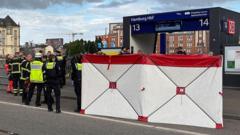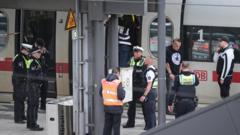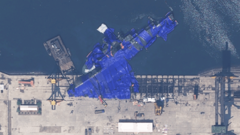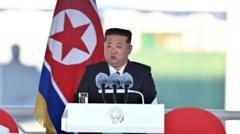In a remarkable act of accountability, North Korea has detained a senior military official over the recent failure of a naval warship launch, intensifying scrutiny of military missteps.
### North Korea's Tough Stance: Official Arrested Over Naval Launch Mishap
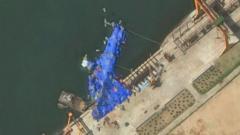
### North Korea's Tough Stance: Official Arrested Over Naval Launch Mishap
North Korea expresses its discontent with a major official's arrest, signaling a stringent approach to military failures.
North Korea has taken a drastic step in the wake of a failed warship launch, culminating in the arrest of senior official Ri Hyong-son, deputy director of the ruling Workers' Party's Munitions Industry Department. This marks the fourth official detained over the incident that has drawn ire from the nation’s leader, Kim Jong Un. According to state-run news agency KCNA, the 5,000-ton destroyer tipped over during its launch, leading to hull damage and sparking what Kim described as a "criminal act" that undermined the country's dignity.
The recent arrest highlights a broader pattern in which officials are held accountable for failures, especially in the military context. Ri, now the highest-ranking individual arrested related to this incident, is part of the Central Military Commission, which presides over the Korean People's Army's operations and military policies. Three other officials connected to the shipyard in Chongjin, including the chief engineer and construction head, have also been placed in custody this past weekend following the disastrous event.
During a recent address, Kim characterized the circumstances of the mishap as resultant from “absolute carelessness, irresponsibility, and unscientific empiricism.” The ultimate consequences for the detained officials remain uncertain, however, harsh punishments, including forced labor or death sentences, are not uncommon in the nation’s authoritarian regime for perceived failures.
Experts like Chun In-bum, a former commander of South Korea's special forces, see Kim’s reaction as an alarming testament to North Korea’s resilience and a clear indication of its commitment to developing military capabilities. Furthermore, Michael Madden, a North Korea specialist, speculates that internal pressures to expedite military advancements may have contributed to the mishap at the shipyard.
Interestingly, the mishap comes on the heels of a recent unveiling of another warship, which Kim had called a breakthrough in naval modernization expected to deploy next year. This incident signals North Korea's intent to bolster its military infrastructure, a strategic priority for the regime as it seeks to assert its sovereignty in the region.
The recent arrest highlights a broader pattern in which officials are held accountable for failures, especially in the military context. Ri, now the highest-ranking individual arrested related to this incident, is part of the Central Military Commission, which presides over the Korean People's Army's operations and military policies. Three other officials connected to the shipyard in Chongjin, including the chief engineer and construction head, have also been placed in custody this past weekend following the disastrous event.
During a recent address, Kim characterized the circumstances of the mishap as resultant from “absolute carelessness, irresponsibility, and unscientific empiricism.” The ultimate consequences for the detained officials remain uncertain, however, harsh punishments, including forced labor or death sentences, are not uncommon in the nation’s authoritarian regime for perceived failures.
Experts like Chun In-bum, a former commander of South Korea's special forces, see Kim’s reaction as an alarming testament to North Korea’s resilience and a clear indication of its commitment to developing military capabilities. Furthermore, Michael Madden, a North Korea specialist, speculates that internal pressures to expedite military advancements may have contributed to the mishap at the shipyard.
Interestingly, the mishap comes on the heels of a recent unveiling of another warship, which Kim had called a breakthrough in naval modernization expected to deploy next year. This incident signals North Korea's intent to bolster its military infrastructure, a strategic priority for the regime as it seeks to assert its sovereignty in the region.

